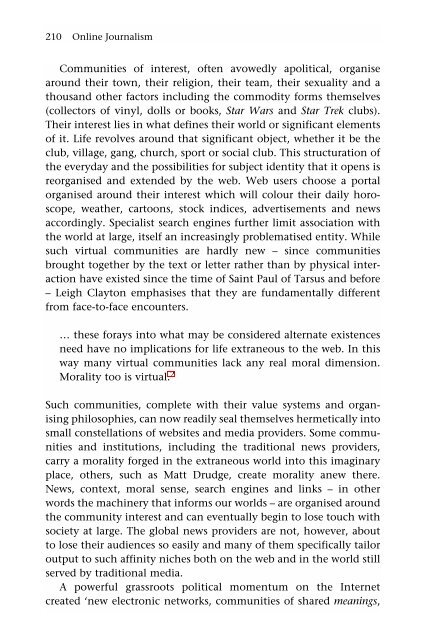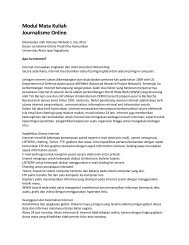Online Journalism - Ayo Menulis FISIP UAJY
Online Journalism - Ayo Menulis FISIP UAJY
Online Journalism - Ayo Menulis FISIP UAJY
Create successful ePaper yourself
Turn your PDF publications into a flip-book with our unique Google optimized e-Paper software.
210 <strong>Online</strong> <strong>Journalism</strong><br />
Communities of interest, often avowedly apolitical, organise<br />
around their town, their religion, their team, their sexuality and a<br />
thousand other factors including the commodity forms themselves<br />
(collectors of vinyl, dolls or books, Star Wars and Star Trek clubs).<br />
Their interest lies in what defines their world or significant elements<br />
of it. Life revolves around that significant object, whether it be the<br />
club, village, gang, church, sport or social club. This structuration of<br />
the everyday and the possibilities for subject identity that it opens is<br />
reorganised and extended by the web. Web users choose a portal<br />
organised around their interest which will colour their daily horoscope,<br />
weather, cartoons, stock indices, advertisements and news<br />
accordingly. Specialist search engines further limit association with<br />
the world at large, itself an increasingly problematised entity. While<br />
such virtual communities are hardly new – since communities<br />
brought together by the text or letter rather than by physical interaction<br />
have existed since the time of Saint Paul of Tarsus and before<br />
– Leigh Clayton emphasises that they are fundamentally different<br />
from face-to-face encounters.<br />
… these forays into what may be considered alternate existences<br />
need have no implications for life extraneous to the web. In this<br />
way many virtual communities lack any real moral dimension.<br />
Morality too is virtual. 2<br />
Such communities, complete with their value systems and organising<br />
philosophies, can now readily seal themselves hermetically into<br />
small constellations of websites and media providers. Some communities<br />
and institutions, including the traditional news providers,<br />
carry a morality forged in the extraneous world into this imaginary<br />
place, others, such as Matt Drudge, create morality anew there.<br />
News, context, moral sense, search engines and links – in other<br />
words the machinery that informs our worlds – are organised around<br />
the community interest and can eventually begin to lose touch with<br />
society at large. The global news providers are not, however, about<br />
to lose their audiences so easily and many of them specifically tailor<br />
output to such affinity niches both on the web and in the world still<br />
served by traditional media.<br />
A powerful grassroots political momentum on the Internet<br />
created ‘new electronic networks, communities of shared meanings,
















